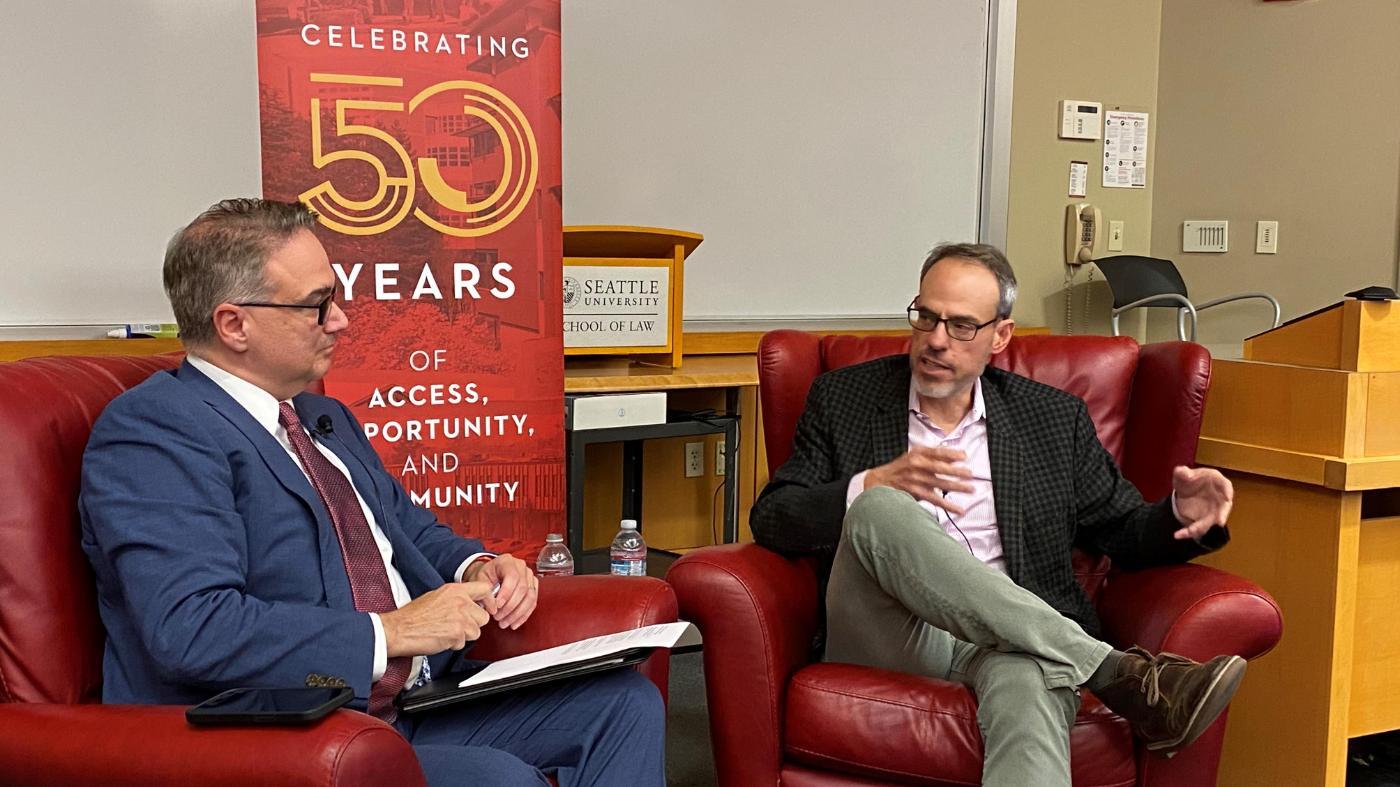Two things are invaluable for lawyers working at Amazon, according to General Counsel David Zapolsky — a wide variety of client experiences and top-notch writing skills.
Speaking at Seattle University School of Law as part of Dean Anthony E. Varona’s Luminaries in Law Lecture and Conversation Series, Zapolsky said Amazon is notorious for banning PowerPoint presentations in its meetings.
“We need people who can write. We’re a very narrative-driven culture,” he said, describing Amazon’s tradition of six-page memos for making decisions. “A well-written six pager can provide everybody with much more of a grounding in the problem and put everyone at an even knowledge level.”
Several graduates of Seattle U Law’s highly ranked legal writing program have worked in the general counsel’s office and other departments at Amazon, the world’s preeminent online retailer described by PBS as “one of the most influential economic and cultural forces in the world.”
But Zapolsky said it’s important for prospective in-house lawyers to get experience at law firms or government agencies first. “We’re bad at training,” he said, laughing. “Law firms are much better at providing basic training for lawyers.”
The Dean’s Luminaries in Law Lecture and Conversation Series brings to Seattle U Law the most nationally and internationally prominent lawyers, from private practice, government, public interest, and the academy, to discuss their careers, share their bold ideas, and map out the future of law.
Zapolsky himself started his legal career as a prosecutor in New York, building his skills as a litigator under reform-oriented District Attorney Elizabeth Holtzman. As a graduate of University of California, Berkeley School of Law, he was drawn to public service and inspired by the career of Attorney General Robert F. Kennedy. He later moved to law firm Wachtell, Lipton, Rosen and Katz.
The move west to Seattle was prompted by a desire to find more work-life balance and time with his infant son. When “total and complete luck” led him to Amazon, he found a place where he could thrive.
“When you put yourself in a position where you’re happy, you’re doing your best work. You’re able to build a good reputation,” he told the Seattle U Law audience. “You make your own luck by putting yourself in a position where you can do your best work.”
Zapolsky joined Amazon in 1999 as the company’s only litigator. He built his department over several years and was eventually recruited to the general counsel position. “I had the opportunity to dive deep into lots of different areas of the business,” he said. “That’s why I encourage lawyers working for me to move around over the course of the years, to get those different experiences. We’re in six different industries, so you have to learn those business profiles.”
Amazon has been successful as an innovator because of “maniacal, continued focus on customers,” a concentration on long-term needs and goals rather than quarterly targets, and its location in Seattle where people value work-life balance and the environment, Zapolsky said.
As general counsel, Zapolsky also oversees the company’s pro bono initiative, known as the Amazon Justice League, which includes working with domestic violence survivors at Mary’s Place, intellectual property services for artists, and criminal records expungement with the King County Bar Association. He also described the company’s efforts to encourage science and technology education through fellowships and scholarships, including the Gregoire Fellowship program.
Zapolsky spoke of pro bono work as not optional but instead part of a lawyer’s ethical and professional obligations. “It’s not optional. This is part of being a lawyer,” he said. “This is quid pro quo of being a member of the bar.”
“What a delight it was to host and interview Mr. Zapolsky,” said Dean Varona. “David is a sterling example of an attorney at the loftiest heights of private practice who engages in very significant and impactful public interest and social justice lawyering through his extensive pro bono work. I am glad that our students were able to learn from and meet him.”

